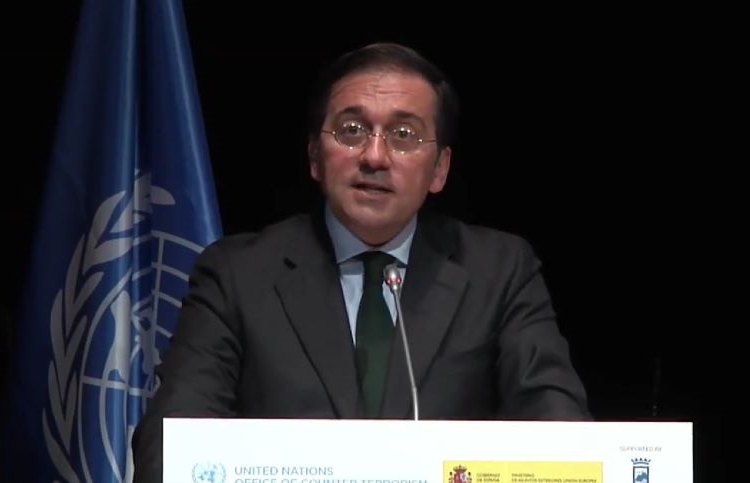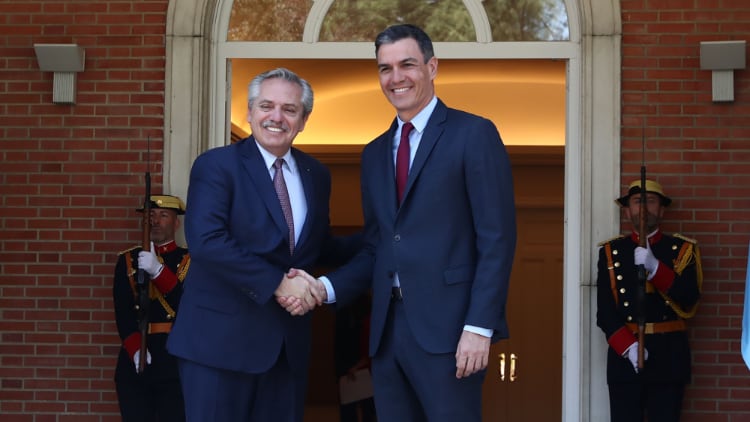The Diplomat
The Minister of Foreign Affairs, José Manuel Albares, opened yesterday in Malaga the High Level International Conference on Human Rights, Civil Society and the Fight against Terrorism, during which he proposed the creation of a global trust fund for the victims of terrorism “to complement and support public policies and those that already exist at the national level”.
The conference, co-organized by the Ministry of Foreign Affairs and the United Nations Office of Counter-Terrorism (UNOCT) at the Malaga Trade Fair and Congress Center, was opened by videoconference by the UN Secretary General, Antonio Guterres, who stated during his speech that it is essential that actions in response to terrorism be based on the rule of law, human rights and gender equality. “As a moral duty, a legal obligation and a strategic imperative, let us put human rights where they belong: at the forefront of the fight against terror,” said Guterres. “Terrorism is not just an attack on innocent people but an assault on human rights,” added the secretary-general, who also recalled that “the Islamic State and Al Qaeda are expanding in Africa and terrorism is resurgent in Afghanistan.”
For his part, the UN Under-Secretary General for Counter-Terrorism, Vladimir Voronkov, warned that “the fight against terrorism helps to protect human rights, but only if human rights are protected while fighting terrorism”, because the aim of terrorists is precisely to “seek disproportionate responses” from States in order to “undermine public confidence in governments to protect their citizens”.
During his speech, José Manuel Albares announced that a new UNOCT office will soon be opened in Madrid, which represents a “recognition” by the UN of the “intense work” carried out by Spain in the fight against terrorism, “a phenomenon that, unfortunately, we know very well”. The next office in Madrid -whose opening was announced in early March by the Deputy Director of International Cooperation against Terrorism of the Ministry of Foreign Affairs, Carlos Díaz- will be in charge of developing projects related to the use of sport as a tool against radicalism, the protection of vulnerable targets and critical infrastructures and the defense of victims.
Likewise, the minister paid yesterday an “emotional tribute to all the victims of terrorism”. “We neither forget nor will we ever forget them, their memory and what they represent,” he said. “We cannot fail the victims, their families and our society and future generations,” he continued. For this reason, he announced, the Spanish government has set two “ambitious goals” for the first Global Congress of Victims of Terrorism, to be held next September in New York (coinciding with the ministerial week of the UN General Assembly) under the sponsorship of Spain and the UN: “the creation of a global network of associations of victims of terrorism that will allow them to share experiences and strengthen their voice at the international level” and “the creation of a trust fund for victims of terrorism that complements and supports public policies and those that already exist at the national level.”
Likewise, Albares defended “the fight against terrorism with full respect for the rule of law” and recalled that the aim of terrorists is “to terrorize our societies and pit us against each other.” “The procedural guarantees, the separation of powers and the bases of the rule of law are our strength, these guarantees are the source of our legitimacy in the face of barbarism, there are no shortcuts that are worthwhile in this endeavor,” he added. The minister also warned that the Sahel region has become the “epicenter of jihadist terrorism.” “Let’s not forget that, although Daesh and jihadist terrorism has been greatly reduced in the Middle East, in Syria and Iraq, this possibility of a very authoritarian Islamic regime reappears with the Taliban in Afghanistan and is already present in Africa,” he told the press after the opening of the conference.
The UNOCT
The opening session of the conference was followed by a High-Level Ministerial Segment and several thematic sessions focusing on human rights, the rule of law and principled humanitarian action in the context of counter-terrorism; support for victims and survivors of terrorism; strengthening civil society efforts to prevent and combat terrorism; and the role of the United Nations Counter-Terrorism Architecture. The High-Level Conference will culminate in an outcome document prepared by UNOCT and the Government of Spain, in consultation with civil society.
The United Nations Office of Counter-Terrorism was established on 15 June 2017 by a decision of the United Nations General Assembly. The creation of the Office was the first major institutional reform undertaken by António Guterres, following his report on the capacity of the United Nations to assist Member States in the implementation of the United Nations Global Counter-Terrorism Strategy. The Malaga Conference is a continuation of the Virtual Dialogue with human rights and civil society partners on building a better paradigm to prevent and combat terrorism, which UNOCT and the Spanish Government organized on 25-26 May 2021.







